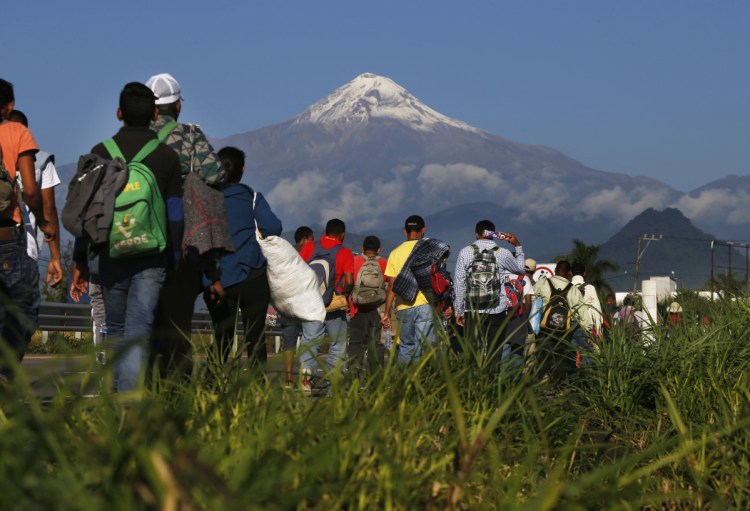MEXICO CITY — Humanitarian aid converged around a stadium in Mexico City where thousands of Central American migrants winding their way toward the United States were resting Tuesday after an arduous trek that has taken them through three countries in three weeks.
Mexico City Mayor Jose Ramon Amieva said 4,500 migrants have arrived at the Jesus Martinez stadium since Sunday, and city officials are bracing to attend as many as 5,500 at the site by Wednesday. Hundreds of city employees and even more volunteers were on hand to sort donations and direct migrants toward food, water, diapers and other basics.
Migrants searched through piles of donated clothes, grabbed boxes of milk for children and lined up to make quick calls home at a stand set up by the Red Cross.
Employees from the capital’s human rights commission registered new arrivals with biographical data – such as age and country of origin – and placed yellow bracelets on wrists to keep count.
Rina Valenzuela wore one of the yellow bracelets as she sat attentively listening to aid workers from the nonprofit Institute for Women in Migration explain the difficulties of applying for and securing asylum in the U.S. Valenzuela, who is from El Salvador, decided she’s better off applying for refuge in Mexico.
“Why go fight there, with as much effort and as much suffering as we have gone through, just for them to turn me back? Well, no,” she said.
The aid workers explained that the asylum process in the U.S. could take years, with no guarantee of approval.
Honduran Antonio Perez listened to the warnings but said he remains determined to continue north.
“This is interesting but tough news,” he reflected. “But neither this nor Donald Trump is going to stop me.”
The atmosphere at the stadium was more institutional and organized than what migrants encountered on the road, where townspeople pushed bags of drinking water, tacos and fruit into their hands as they passed through tiny hamlets.
But there were signs Tuesday that the stadium was already nearing its capacity to hold 6,000 people.
Maria Yesenia Perez, 41, said there was no space in the stadium when she and her 8-year-old daughter arrived during the night, so the two from Honduras slept on the grass outside. Migrants pitched tents in the parking lot and constructed makeshift shelters from plywood covered with blankets and tarps. Forty portable toilets were scattered across the grass.
The stadium’s enclosed space and government intervention makes it difficult for aid workers to reach the migrants, said Nancy Rojas, an Oxfam charity worker who has accompanied the migrants for weeks.
Four big tents have been set up for women and children to sleep under with thin mattresses and blankets, while men were relegated to concrete bleachers.
Several smaller groups were trailing hundreds of miles to the south. Mexico City Mayor Amieva said the city needs to “reinforce” to meet the needs of the migrants, especially vulnerable children and pregnant women.
Mexico City’s central market supplied 3.5 tons of bananas and guavas to refuel the crowd, plus 600 bottles of water. The human rights commission said it planned to set up more tents and eating areas.
Many of the migrants sought treatment for blistered and aching feet, respiratory infections, diarrhea and other maladies. City officials administered vaccines for tetanus and influenza.
In dozens of interviews since the initial caravan set out from Honduras more than three weeks ago, migrants have said they are escaping poverty and rampant violence. Many are families traveling with small children. Some say they left because they were threatened by gang members or had lost relatives to gang violence. Others say they hope to work, secure a good education for their children and send money to support relatives back home.
Send questions/comments to the editors.



Success. Please wait for the page to reload. If the page does not reload within 5 seconds, please refresh the page.
Enter your email and password to access comments.
Hi, to comment on stories you must . This profile is in addition to your subscription and website login.
Already have a commenting profile? .
Invalid username/password.
Please check your email to confirm and complete your registration.
Only subscribers are eligible to post comments. Please subscribe or login first for digital access. Here’s why.
Use the form below to reset your password. When you've submitted your account email, we will send an email with a reset code.